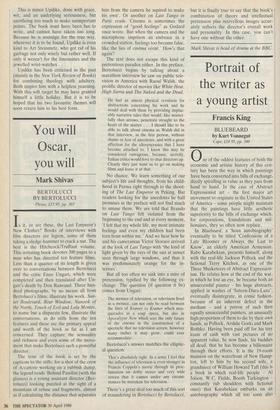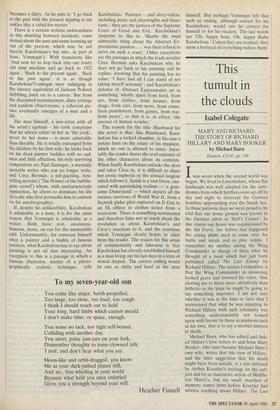Portrait of the writer as a young artist
Francis King
BLUEBEARD by Kurt Vonnegut
Cape, £10.95, pp. 300
0 ne of the oddest features of both the economic and artistic history of this cen- tury has been the way in which paintings have been converted into bills of exchange, dizzily spiralling in value as they pass from hand to hand. In the case of Abstract Expressionist art — the first major art movement to originate in the United States of America — some people might maintain that the paintings have little aesthetic superiority to the bills of exchange which, for corporations, foundations and mil- lionaires, they so often now replace.
In Bluebeard, a 'hoax autobiography' eventually to be titled 'Confessions of a Late Bloomer or Always the Last to Know', an elderly American Armenian, Rabo Karabekian, presents himself, along with the real-life Jackson Pollock and the fictional Terry Kitchen, as one of the Three Musketeers of Abstract Expression- ism. He relates how at the end of the war, in which he lost an eye, he became both an unsuccessful painter — his huge abstracts, applied in washes of `Sateen-Dura-Luxe', eventually disintegrate, in comic fashion, because of an inherent defect in the medium — and a patron of such then equally unsuccessful painters, an unusually high proportion of them to die by their own hands, as Pollock, Arshile Gorki and Mark Rothko. Having been paid off for his tiny loans of cash with vast pictures of no apparent value, he now finds, his buddies all dead, that he has become a billionaire through their efforts. It is the 19-room mansion on the waterfront of New Hamp- ton, left to him by his second wife, a grandniece of William Howard Taft (this is a book in which real-life people — Al Jolson, W.C. Fields, Booth Tarkington — constantly rub shoulders with fictional ones) that Karabekian embarks on an autobiography which all too soon also becomes a diary. As he puts it: 'I go back to the past with the present nipping at my ankles like a rabid fox-terrier.'
There is a certain stylistic awkwardness in this shuttling between incidents, some dotted about the past and some looming up out of the present, which may be not merely Karabekian's but also, in part at least, Vonnegut's. With transitions like 'And now let us hop back into our trusty old time machine and go back to 1932 again', 'Back to the present again', 'Back to the past again', it is as though Karabekian/Vonnegut were indulging in the literary equivalent of Jackson Pollock dribbling paint on to a canvas. But from the disjointed reminiscences, diary jottings and random observations, a coherent pic- ture eventually emerges of a man and a
The man himself, a non-artist with all the artist's egotism – his cook complains that he always refers to her as 'the cook', never by her name – is more admirable than likeable. He is totally estranged from his children by his first wife; he looks back on his dead painter buddies with no sad- ness and little affection; his only surviving companions are Paul Slazinger, a mentally unstable writer who can no longer write, and Circe Berman, a pill-guzzling, best- selling novelist (`The Homer of the bubble- gum crowd') Whom, with uncharacteristic supineness, he allows to dominate his life (it is she who first persuades him to embark on his autobiography).
If, despite his unlikeability, Karabekian is admirable as a man, it is for the same reason that Vonnegut is admirable as a writer. Both have zest, awareness, humour, irony, an eye for the memorably odd. Unfortunately, for someone himself once a painter and a buddy of famous painters, what Karabekian has to say about painting is not all that interesting. An exception to this is a passage in which a famous illustrator, master of a photo- graphically realistic technique, tells Karabekian: 'Painters – and story-tellers, including poets and playwrights and histo- rians – they are the justices of the Supreme Court of Good and Evil.' Karabekian's response to this is: 'Maybe the most admirable thing about the Abstract Ex- pressionist painters . . : was their refusal to serve on such a court.' Other exceptions are the passages in which the trash novelist Circe Berman asks Karabekian why he does not go 'back to 'his painting and he replies, knowing that his painting has no value: 'I have had all I can stand of not taking myself seriously'; and Karabekian's defence of Abstract Expressionist art as something 'wholly apart from food, from sex, from clothes, from houses, from drugs, from can, from news, from crime, from punishment, from :games, from war, from peace', so that it is, in effect, 'the essence of human wonder.'
The reason for the title Bluebeard for this novel is that, like Bluebeard, Kara- bekian has a locked Chamber, in his case a potato barn on the estate of his Matision, which no one is allowed to enter. Inevi- tably the reader shares the avid curiosity of the other characters about its contents When finally Karabekian unlocks the door and takes Circe in, it is difficult to share her erotic euphoria or the sensual langour which follows it. Inside is a vast frieze, exe- cuted with painstaking realism — 'a grue- some Disneyland"— which depicts all the various survivors of World War II, from a Scottish glider pilot captured on D Day to an SS officer in clothes stolen from a scarecrow. There is something sentimental and therefore' false not so much about the revelation as about Karabekian's and Circe's reactions to it, and the reactions which Vonnegut clearly hopes to elicit from the reader. The reason for this sense of sentimentality and falseness is that Karabekian has already established himself as a man living out his last days in a state of stoical despair. The correct ending would be one as chilly and 'hard as the man
himself. But perhaps Vonnegut felt that such an ending, although correct for his Karabekian, would not be correct for himself or for his readers. The last words are 'Oh, happy Soul. Oh, happy Rabo Karabekian.' Unless they are ironical, they seem a betrayal of everything before them.



























































 Previous page
Previous page